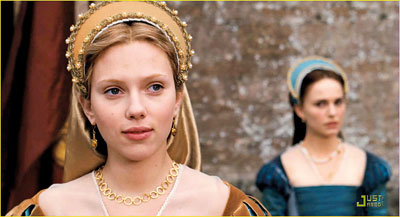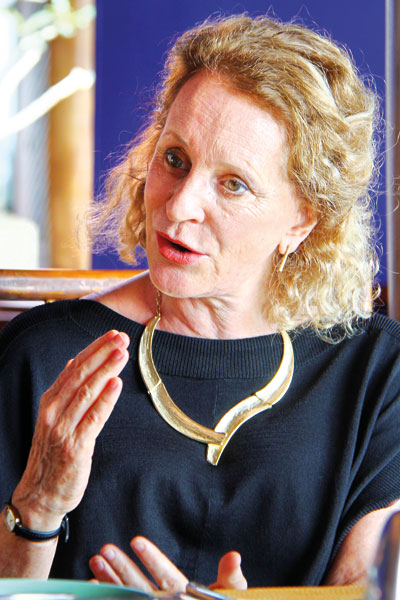In search of little known heroines

From book to film: Scarlett Johansson and Natalie Portman in the Hollywood adaptation of ‘The Other Boleyn Girl’ (2008)
Philippa Gregory found Mary Boleyn when she was hunting for a female pirate. It was in a book about the Tudor navy that she discovered a ship named after Anne Boleyn’s sister. For a moment Gregory was certain there must have been a mistake. But there in the footnotes was Mary, and in her the British author and historian had found an unlikely heroine.
Gregory is the prolific author of a compulsively readable series of novels, among the most famous of which is The Other Boleyn Girl (2001). The story is told from Mary’s perspective – she is Henry the VIII’s mistress before he ever meets Anne. In fact, she is pregnant with his son when her sister steps into court and sweeps the king off his feet. Though Mary bore Henry a son, she disappears from the historical record around the time she marries her second husband. William Stafford is beneath her in the social hierarchy, and Mary is rejected by her family for this one act.
We know so little of Mary – not even where she was when Anne, by then Queen of England, was executed on charges of incest, witchcraft, adultery and conspiracy against the king in 1536. We know not what she made of the great events of her time such as the English Reformation. But Gregory thinks she understands something of Mary from a single document that survives.
Gregory pored over the letter in the archives of the man who served as Henry’s controversial chief minister from 1532 to 1540. Mary wrote to Thomas Cromwell that she had no regrets, even though her marriage to Stafford had so displeased her sister and brother-in-law: ‘I had rather beg my bread with him than to be the greatest queen in Christendom.’ It’s something of a miracle the letter survived, when hundreds of others were probably tossed in the fireplace.
“It was such a surprise to me,” Gregory says, now.“Thank god for Thomas Cromwell and his archive!”
It’s a sentiment I am certain has never been expressed here, in a luxury villa high above the coast of Weligama. Gregory, one of the stars of the 2017 Fairway Galle Literary Festival, has been spending the past few days in Sri Lanka reading Germaine Greer’s Shakespeare’s Wife (featuring another woman called Ann)and sleeping in a house named after the German naturalist Ernst Haeckel.
Gregory will sign many copies of The Other Boleyn Girl these next few days, a reminder that this is the book that made her reputation. It was adapted by the BBC and for Hollywood and inspired three biographies about Mary. It also made famous Gregory’s approach of writing from the perspective of a lesser known character witnessing the tumult of history.
Gregory, who studied journalism, English literature and history before earning her doctorate in 18th century literature, is often hailed as the ‘Queen of British Historical Fiction.’ She began publishing in 1987 and is today the author of close to 40 books. She is also, almost overwhelmingly, a chronicler of women’s lives.
Her most recent series is a sprawling 7-volume set on the Plantagenets and the Cousins’ War between the houses of Lancaster and York. Each volume takes the perspective of one woman from those decades – from Elizabeth Woodville, the commoner who became King Edward IV’s beloved consort in 1464 and remained his wife till his death in 1483 to Margaret Pole, Countess of Salisbury, only one of two women in 16th century England to be a peeress in her own right.
Their extraordinary lives, filled with intrigue, dramatic reversals of power, sweeping love affairs and bloody conflict between the houses of York and Lancaster, are a historian’s dream, and yet very little is known about them. “For so long, the history of the world has been the history of men. It became apparent to me that this is not about some extraordinary individual women that we have missed but that we do not record women at all. And when they are active, powerful and agents of their own change, we regard them as dangerous, or power crazed or corrupt or not really women.”
In her novels, Gregory’s response to this prejudice has been “to go in with the women.” Often, it is while writing one book that she discovers who the next one will be about. “Whoever she is, she guides me through the history. Literally, I went from one woman to another to another,” she says. “In the end, when you look down you have this god’s eye view where you see this tapestry of all these people and their reasons for doing things.”
Switching between the skins of mothers and daughters, sworn enemies and old allies, sensual women and saintly women, the author is stretched in interesting ways. While writing the Cousins’ War series for instance, just in the first two books she switched between York and Lancaster, beginning with The White Queen and following with The Red Queen. “It felt like disloyalty,” she says laughing, “but I also thought that was rather wonderful, because that is the experience of people in any civil war – there is a lot of changing of sides.”
The English court was rife with conspiracy, and women were often at their heart. “The power of the bedroom, the power of the advisor, the mother’s power over her children, and the whore’s power – all these were ways in which women tried to take power when they were officially powerless,” says Gregory. It is striking, when reading these books to observe the extent of that powerlessness, particularly when it comes to money, which on a woman’s marriage became entirely her husband’s.
“It is so hard, that I think modern women struggle to imagine it. That’s a history that’s been itself obscured,” says Gregory.“One of the reasons we find it so hard to campaign for our rights today is because we have forgotten how long and hard the campaign was up until now.”

Philippa Gregory: Chronicling the power of women. Pic by Indika Handuwala
Gregory’s roots as a feminist lie in her childhood. She and her sister were raised by a widowed mother, and when she left home to go to school, it was an all girls’ one. “I am very, very comfortable with seeing women in power, and it was quite a shock to go into the outside world and become a journalist, as I did, and see a world of work that was completely dominated by men in which women were not highly regarded.” Subsequently, when Gregory went to work at a BBC radio newsroom, she was the only woman there. “If you looked at it, you would say, journalists are men, and what is she doing there?”
Gregory used to laugh about how her grandmother was (very briefly) a suffragette. The story went that her grandmother wanted to go to one meeting, but changed her mind when her husband threatened to divorce her. “I used to think it was a joke, but then I thought about it and it seemed to me that that was a terrible thing he did to her, a wicked thing, because he was threatening to take away her four children.” This threat would usually be made in instances of adultery or a terrible breach of promise, but here it was being made because a woman wanted to think for herself. “It’s an extraordinary example of male power, right in my family.”
Gregory’s great-great-great-great aunt was Mary Hayes, a dear confidant of the now iconic feminist philosopher Mary Wollstonecraft (incidentally, also the mother of Mary Shelley who wrote Frankenstein). They were so close that Hayes was at Wollstonecraft’s deathbed in 1797.
It’s a piece of family trivia that Gregory narrates with evident pride. At 63, she is herself a woman to be reckoned with.“My husband once said ‘Could feminism be an inherited gene? In which case god help us!’” Gregory laughs and then adds: “It’s a lovely thought, isn’t it?”


